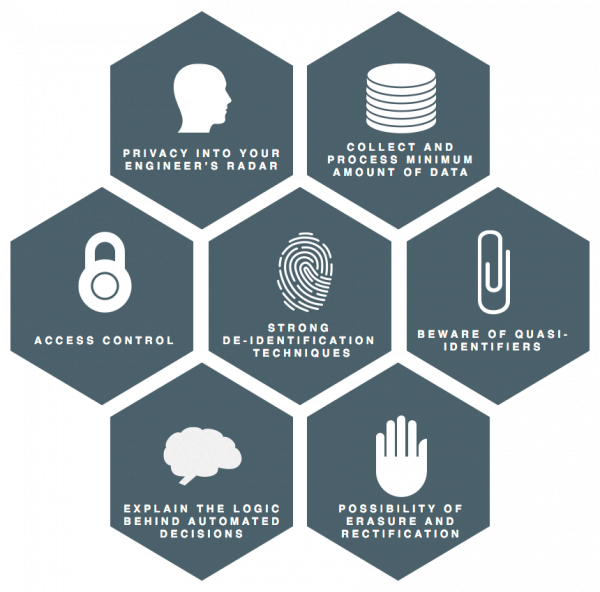AI Therapy: Privacy Concerns And The Potential For Surveillance

Table of Contents
Data Collection and Storage in AI Therapy
AI therapy platforms collect vast amounts of personal data, including sensitive information about mental health, personal relationships, and life experiences. This raises significant privacy concerns, particularly regarding the security and ethical use of this data.
The Scope of Data Collected
AI therapy applications gather a wide range of data, often exceeding what traditional therapy might involve. This includes:
- Textual chat logs: Detailed records of every conversation between the user and the AI.
- Voice recordings: Audio recordings of therapy sessions, providing additional layers of data.
- Biometric data: Data like heart rate variability, collected through wearable devices or smartphone sensors, can offer insights into emotional states.
- Location data: If the app uses GPS, location data might be collected, although hopefully only with explicit user consent.
- API integrations: Some apps may integrate with other health or fitness apps, potentially sharing even more sensitive data.
The sheer volume and sensitivity of this data make it a prime target for malicious actors. Robust security measures are essential to prevent data breaches and unauthorized access.
Data Security and Encryption
Protecting user data in AI therapy requires rigorous security protocols. However, the complexity of AI systems and the potential for vulnerabilities remain a concern. Potential risks include:
- Data breaches: Unauthorized access to databases containing user information.
- Hacking: Attempts to gain unauthorized access to the system for malicious purposes.
- Ransomware attacks: Malware that encrypts data and demands a ransom for its release.
- Insider threats: Malicious or negligent actions by individuals within the organization.
Lack of transparency regarding security protocols can significantly erode user trust. Users need clear information about the measures in place to protect their data.
Data Retention Policies and User Control
Clear, concise, and easily accessible data retention policies are crucial. Users should have full control over their data, encompassing:
- Access: The ability to view their own data.
- Modification: The ability to correct inaccuracies.
- Deletion: The right to have their data deleted upon request.
These policies should outline data storage duration, data usage purposes, and user rights to data control. Lack of user control over data represents a major privacy risk. Users should be empowered to make informed decisions about their data.
The Potential for Algorithmic Bias and Discrimination
AI algorithms learn from the data they are trained on. If this data reflects existing societal biases (e.g., racial, gender, socioeconomic), the AI may perpetuate and even amplify these biases in its therapeutic responses.
Bias in Training Data
The datasets used to train AI therapy algorithms often contain biases reflecting existing societal inequalities. This can lead to:
- Misinterpretation: The AI may misinterpret or dismiss the concerns of users from marginalized groups.
- Unequal access: Users from certain demographics might receive less effective or even harmful therapeutic responses.
This can lead to unequal access to effective mental healthcare, exacerbating existing health disparities.
Lack of Transparency in Algorithmic Decision-Making
Many AI algorithms function as "black boxes," making it difficult to understand how they arrive at their conclusions. This lack of transparency raises concerns about:
- Fairness: It's hard to assess whether the algorithm is treating all users fairly.
- Accountability: If an algorithm makes a harmful decision, it's difficult to determine why and hold anyone responsible.
This lack of transparency undermines user trust and makes it challenging to identify and correct algorithmic bias.
Surveillance and Monitoring Concerns
Data collected through AI therapy platforms could be used for purposes beyond therapeutic goals, raising serious ethical and privacy concerns.
Data Usage for Purposes Beyond Therapy
There are valid concerns that data collected might be used for:
- Targeted advertising: Using user data to target mental health-related advertising.
- Profiling: Creating detailed profiles of users based on their therapy data.
- Government surveillance: Government agencies accessing user data without proper authorization.
This raises serious ethical questions about data ownership and informed consent. Strict regulations and ethical guidelines are needed to prevent misuse.
The Potential for Misuse by Healthcare Providers
While less likely, there's a potential for healthcare providers to misuse AI therapy data, violating patient confidentiality. This could include:
- Unauthorized access: Accessing patient data without proper authorization.
- Disclosure of confidential information: Sharing sensitive patient information without consent.
Strong ethical guidelines and oversight mechanisms are crucial to mitigate this risk. Regular audits and robust security protocols are essential.
Conclusion
AI therapy holds significant promise for improving mental healthcare access and effectiveness. However, the privacy concerns and potential for surveillance associated with these technologies must be addressed proactively. Developing robust data security measures, promoting transparency in algorithmic decision-making, ensuring user control over their data, and establishing clear ethical guidelines are crucial steps to mitigate these risks. Without careful consideration of these issues, the potential benefits of AI therapy may be overshadowed by the serious threat to user privacy. Moving forward, a responsible approach to AI therapy necessitates a focus on data protection and user autonomy to ensure its ethical and beneficial application. We must prioritize user privacy in the development and implementation of all AI therapy solutions. Let's work together to ensure that AI therapy benefits everyone safely and ethically.

Featured Posts
-
 2025 San Diego Padres Baseball Complete Broadcast Schedule Unveiled
May 15, 2025
2025 San Diego Padres Baseball Complete Broadcast Schedule Unveiled
May 15, 2025 -
 Predicting The Padres Vs Yankees Series San Diegos Pursuit Of A 7 Game Victory
May 15, 2025
Predicting The Padres Vs Yankees Series San Diegos Pursuit Of A 7 Game Victory
May 15, 2025 -
 Muncys Comments On Arenado Trade Latest From The Dodgers
May 15, 2025
Muncys Comments On Arenado Trade Latest From The Dodgers
May 15, 2025 -
 Timbers Seven Match Unbeaten Streak Broken By San Jose
May 15, 2025
Timbers Seven Match Unbeaten Streak Broken By San Jose
May 15, 2025 -
 Millions Made From Exec Office365 Account Breaches Fbi Investigation
May 15, 2025
Millions Made From Exec Office365 Account Breaches Fbi Investigation
May 15, 2025
Latest Posts
-
 Ovechkin Priblizhaetsya K Rekordu Grettski Prognoz N Kh L
May 15, 2025
Ovechkin Priblizhaetsya K Rekordu Grettski Prognoz N Kh L
May 15, 2025 -
 Rekord Grettski N Kh L Obnovila Prognoz Na Dostizhenie Ovechkinym
May 15, 2025
Rekord Grettski N Kh L Obnovila Prognoz Na Dostizhenie Ovechkinym
May 15, 2025 -
 Kogda Ovechkin Pobet Rekord Grettski Obnovlenniy Prognoz N Kh L
May 15, 2025
Kogda Ovechkin Pobet Rekord Grettski Obnovlenniy Prognoz N Kh L
May 15, 2025 -
 Trouver Un Emploi De Gardien Conseils Et Ressources Pour Les Candidats
May 15, 2025
Trouver Un Emploi De Gardien Conseils Et Ressources Pour Les Candidats
May 15, 2025 -
 Salaires Des Gardiens Remuneration Et Conditions De Travail
May 15, 2025
Salaires Des Gardiens Remuneration Et Conditions De Travail
May 15, 2025
